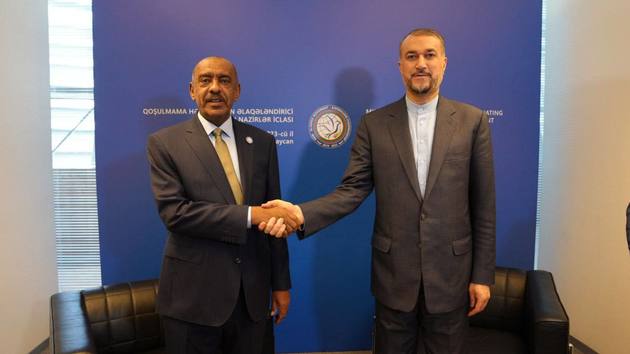After seven years of severing ties, Sudan and Iran have restored diplomatic relations. In July 2023, the Sudanese Acting Foreign Minister, Ambassador Ali Al-Sadiq, and his Iranian counterpart, Hossein Amir-Abdollahian, issued a joint statement agreeing to resume diplomatic relations. On 9 October 2023, the Sudanese Foreign Ministry announced the return of official diplomatic relations. It is evident that extensive efforts have been made by both Khartoum and Tehran to mend fences in recent months, particularly in light of Saudi Arabia and Iran’s rapprochement in March 2023 following months of talks facilitated by China.
The crisis between the two countries began in 2016, when Sudan decided to cut off ties with Iran due to intense hostilities between Saudi Arabia and Iran following Iranian protesters stormed the Saudi Embassy in Tehran. The Sudanese government made the decision at the time to close all Iranian schools and cultural centers and expel diplomatic officials and the ambassador.
Evolution of Iran-Sudan Relations
Over the course of nearly three decades, relations between Khartoum and Tehran have historically been extremely close. Throughout the 1990s and the first decade of the 21st century’s third millennium, Tehran has been both Khartoum’s ally and a significant source and supplier of weapons. Iran views Sudan as an important hub for Iranian movements in the Horn of Africa region, within the context of its expansive regional project that extended to the African arena during the presidency of President Mahmoud Ahmadinejad, when the two countries were under US pressure and sanctions.
In April 1997, for instance, the two countries inked over thirty agreements covering a wide range of topics, including cooperative projects, training exchanges, and the qualification and training of Sudanese army and Security and Intelligence Service officers in Tehran. In March of 2008, the two countries signed a joint defense agreement that includes advanced defense coordination and joint efforts to promote security and peace in the Horn of Africa. Prior to severing ties, Sudan and Iran had strong ties, particularly in the military realm, as Iranian ships frequently docked in Port Sudan on the Red Sea.
In 2014, however, tensions between the two countries began to rise as Tehran pulled away from Khartoum in the face of Sudan’s worsening economic crisis and its inability to provide meaningful benefits to the country’s economy. The following year, Sudan joined the Saudi military campaign in Yemen, while Iran backed the Houthis there. This placed both Sudan and Iran in a position of indirect confrontation in Yemen, resulting in the escalation of tensions in their bilateral relations, which manifested in 2016 when Sudan severed all diplomatic ties with Iran. This persisted in a heightened regional context, where the intensity of polarization grew and hostile policies became more manifest in the region.
Similar to how regional factors fueled tensions that ultimately led to the two nations’ estrangement, they also played a role in the resumption of bilateral ties in 2023 after the Saudi-Iranian rapprochement created previously unoccupied space for the resumption of Sudanese-Iranian relations. This does not, however, imply that the Sudanese leadership has decided to alter its pattern of regional alignment in a manner that could incur substantial political and economic costs.
The Effect of Rapprochement on Iran and Sudan
Khartoum’s rapprochement with Tehran will have an effect on the positions of regional and international powers regarding the conflict between the Sudanese Armed Forces (SAF) and the Rapid Support Forces (RSF) that is currently taking place in Khartoum. It appears that the SAF wish to send a message to a number of countries in the regional and global arena, demonstrating that it has options in this crisis that allow it to adjust its military operations against the RSF to some degree and make progress in the military operations that are occurring in Khartoum and certain states of Darfur, through its rapprochement with a potent regional ally that has vast experience providing military hardware and expertise to its regional allies, which could play a role in shifting the current balance of power on the battlefields.
In effect, Iran can provide the SAF with effective military equipment, allowing the military institution to withstand a longer period of conflict and exhaust the RSF. Iran may be attempting to reestablish its strong presence in Sudan and the region that stretches along Africa’s eastern coast, as the recent rapprochement with Sudan aids Tehran’s positioning in the East African region, where Iran has a military presence through the Houthis in Yemen, as well as a close history of strong relations with a number of countries in the region, including Eritrea, Kenya, and the Comoros, as well as some active parties in Somalia. Sudan may even become the epicenter of Iranian activity extending from the west to the center of Africa and from the Lakes region to the south of the continent, given Iran’s ongoing efforts to revitalize its approach to Africa in light of the isolationist policies of the West towards the continent.
Put succinctly, the agreement between Saudi Arabia and Iran has allowed the latter to reposition itself in the region in a different way than the tense relations that characterized earlier years. In light of the current complex regional context, Iran will be eager to seize any opportunity it can to reclaim some of the influence it has lost in Africa over the past few years. Sudan appears to be among the most significant nations through which Iran hopes to bolster its standing and regain its waning sway in East Africa, which could potentially have long-term effects on the current equilibrium in the Middle East and Africa.













